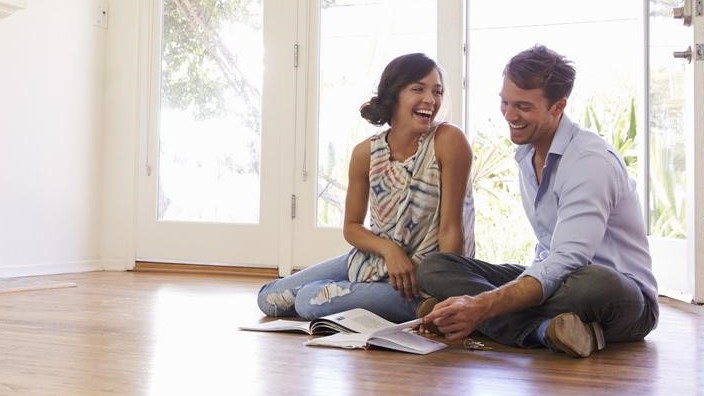 A dozen roses, three-course dinners and giant teddy bears are some of the more common ways to spoil your partner on Valentine’s Day. But if you’re planning to make the leap this year by asking your partner to move in with you, now might be the time to bring up money before the packing starts.
A dozen roses, three-course dinners and giant teddy bears are some of the more common ways to spoil your partner on Valentine’s Day. But if you’re planning to make the leap this year by asking your partner to move in with you, now might be the time to bring up money before the packing starts.
That’s right, money. Because for some people, tall, dark and handsome might be the number one priority when it comes to finding the one - or keeping them - but finances are an important part of any relationship and getting it right can be key to avoid unnecessary tension with your significant other. So from bills to savings goals, here are five financial decisions every couple must make before moving in together…
1. Work out how you'll pay bills
From cooking together to coming home to a friendly face, there are many things to look forward to once you’ve moved in with your partner. But before you fall headfirst into cohabitation bliss, you’ll both need to sit down and discuss how you plan to budget and pay monthly bills.
This will differ between couples, as some prefer to have an even 50/50 split or dictate bills based on who earns more. As many as 48% of men expect to earn more than their partner, while 35% of women expected to earn less, so it’s up to you to decide how that plays out when it comes to coughing up for bills.
An easy way to share the responsibility might be to open a joint bank account where you can both contribute to monthly expenses, like groceries and rent. This way, you’ll still be able to keep your current bank account for personal spending, if you do still want some degree of separation.
2. Decide on utilities for your shared home
While there are some easy decisions to make, like choosing between Netflix or Stan, you’ll also need to decide on a gas and electricity provider. That means discussing things like, whether cheap bills are more important than green energy.
One thing to keep in mind is that you may not get to choose your energy supplier when renting an apartment where your lease is inclusive of bills, so it’s important to read your rental agreement thoroughly.
3. Pick an insurance policy that's right for you
Your next step is to pick an insurance policy that’s right for your household. For instance, as a renter you may only need contents insurance, but if you’re moving into a home one or both of you owns, then a home and contents insurance policy could be more up your alley.
If you've already got an insurance policy, and the majority of your belongings will be shared, decide whether you'll add your partner's belongings to your existing policy, or get a new joint policy together. Don’t forget to list anything you want extra insurance cover for, like jewellery or a laptop on your policy.
4. What savings goals to prioritise
From holidays, to buying a new car or even saving up for a house deposit, every couple needs to have something to work toward, especially since more than half of Aussies were willing to break up with a partner who didn’t have savings goals! | Kirsty Lamont, mozo.com.au
For example, it’s common for many couples to live together as a ‘trial’ before they officially tie the knot. In fact, the Australian Institute of Family Studies found that in 2016, 81% of couples were living together before getting married.
So if marriage is on the cards for you and your partner, you’ll need to discuss how you both plan to make your dream day a reality, whether it’s through saving up or taking out a wedding loan.
It’s a good idea to get these savings goals out in the open sooner rather than later, so you can work together to establish a household budget and a savings gameplan. This will help map out how much you’ll each need to contribute to your goals as well as how much you can keep for personal spending.
5. What's your and what's ours
One of the more challenging parts of living together is defining personal boundaries in a shared space. If you’ve become accustomed to living alone, you’ll need to work out if items like furniture or cookware now become ‘ours’.
And if one of you is moving in with big-ticket items, like a Thermomix or a vintage china set, it’s worth setting some ground rules and discussing what would happen if the other person damaged or broke the item.
While it’s an awkward conversation to have, being financially prepared for the worst case scenario can not only help you avoid an even more awkward conversation later on but also strengthen your relationship.
Kirsty Lamont is a Director at financial comparison website mozo.com.au. She is passionate about helping Australians make better, more informed money choices from their insurance to weekly groceries.
This article is intended to provide general information of an educational nature only. This information has been prepared without taking into account your objectives, financial situation or needs. Therefore, before acting on this information, you should consider its appropriateness having regard to these matters and the product terms and conditions. Terms, conditions, fees, charges and credit criteria apply. We do not recommend any third party products or services and we are not liable in relation to them. Any links to third party websites are for your information only and we do not endorse their content. Information in this article is current as at the date of publication.

